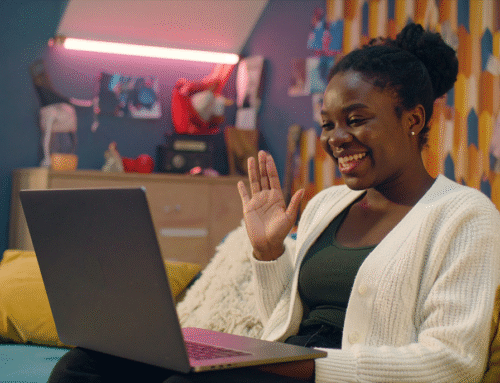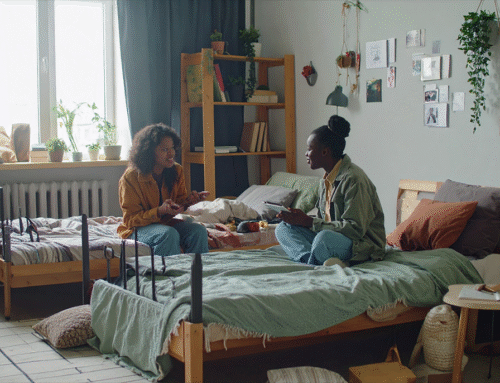7 Ways to Build Healthy Romantic Relationships in College
7 Ways to Build Healthy Romantic Relationships in College
College dating feels like trying to solve a Rubik’s cube while riding a rollercoaster – everything’s moving fast, you’re not sure which way is up, and just when you think you’ve got it figured out, someone throws you a curveball. Between classes, social pressures, and figuring out who you even are as a person, adding romantic relationships to the mix can feel overwhelming.
But here’s the thing: college is actually one of the best times to learn how to build genuinely healthy romantic relationships. You’re surrounded by people your age, you have more freedom to explore what you want, and you’re already in a growth mindset. The key is approaching dating with intention rather than just letting things happen to you or copying what you see in movies.
The relationships you build in college don’t just affect your happiness now – they’re teaching you patterns and skills you’ll carry into all future relationships. Learning to communicate well, set boundaries, and choose partners who actually enhance your life rather than drain it? Those skills are worth way more than any class you’ll take.
1. Know Yourself Before You Try to Know Someone Else

Ever notice how some people jump from relationship to relationship but always end up with the same problems? That’s usually because they’re trying to figure out who they are through other people instead of doing the work on their own first. College is the perfect time to get clear about your values, interests, and what you actually want from life and relationships.
This doesn’t mean you need to have your entire life figured out before you can date anyone – that’s impossible and not the point. It means taking time to understand your own patterns, triggers, and what makes you feel genuinely happy versus what just provides temporary validation. When you know yourself, you make better choices about who you spend time with.
Self-awareness also makes you a better partner because you can communicate your needs, recognize your own stuff versus your partner’s stuff, and show up authentically instead of trying to be whoever you think they want you to be. Plus, people who are comfortable with themselves are naturally more attractive because they’re not constantly seeking validation or trying too hard.
Self-Discovery Strategies:
- Spend time alone doing things you enjoy without needing to document it
- Notice what activities and people energize versus drain you
- Reflect on patterns from past friendships and relationships
- Identify your core values and what you’re not willing to compromise on
- Practice being honest about your feelings and needs in all relationships
- Take time to process experiences through journaling or talking with trusted friends
Getting Comfortable with Your Own Company
The foundation of healthy relationships is being someone you actually enjoy spending time with. If you can’t be alone without feeling bored, anxious, or desperate for distraction, you’re probably going to enter relationships for the wrong reasons. Practice enjoying your own company through solo activities, hobbies, and quiet time for reflection.
This self-comfort translates into relationship confidence because you’re not clinging to people out of fear of being alone. You’re choosing to be with someone because you genuinely enjoy them, not because you need them to feel okay about yourself.
2. Communicate Like You’re Talking to Someone You Actually Like

Weird how we often communicate better with strangers than with people we’re dating, right? We’re polite to the barista, direct with professors, and honest with friends, but then we get into romantic relationships and suddenly we’re speaking in code, dropping hints, and expecting people to read our minds. Healthy relationships require clear, kind, direct communication from the start.
This means saying what you mean instead of hoping they’ll figure it out, asking for what you need instead of keeping score of what they don’t do, and addressing problems when they’re small instead of letting them build up until you explode. It also means listening to understand rather than just waiting for your turn to talk.
Good communication in college relationships sets you up for success in every future relationship – romantic, professional, and personal. The skills you practice now become habits that serve you forever. Plus, clear communication prevents most of the drama and misunderstandings that make college relationships exhausting and stressful.
Communication Building Blocks:
- Use “I” statements to express feelings without blame
- Ask clarifying questions instead of making assumptions
- Address issues when they happen rather than letting them build up
- Practice active listening without planning your response
- Be specific about needs and expectations rather than hinting
- Show appreciation for positive behaviors instead of only focusing on problems
Making Difficult Conversations Easier
The best time to practice having hard conversations is when the stakes feel lower, like in college relationships where you’re both still learning. Start with smaller issues to build confidence and skills before tackling bigger relationship challenges. Remember that conflict isn’t a sign of a bad relationship – it’s an opportunity to understand each other better and problem-solve together.
Approach difficult conversations with curiosity about your partner’s perspective rather than trying to prove you’re right. The goal is understanding and resolution, not winning.
3. Keep Your Friends and Individual Interests

One of the fastest ways to kill a college relationship is to disappear into it completely, abandoning your friends and interests to spend every waking moment with your romantic partner. This might feel romantic and intense, but it’s actually a recipe for resentment, codependency, and really boring conversations because you have nothing new to talk about.
Healthy relationships enhance your life rather than replacing it. Your friends provide different types of support, perspectives, and fun that no single person can offer. Your individual interests keep you growing as a person and give you things to share with your partner. When you maintain your own life, you bring more energy and excitement to the relationship.
Plus, college friendships often outlast college relationships, so don’t sacrifice long-term connections for short-term romantic intensity. The partners worth keeping will encourage your friendships and interests rather than feeling threatened by them.
Independence Preservation Tactics:
- Schedule regular friend time that’s separate from couple activities
- Continue pursuing hobbies and interests you had before the relationship
- Maintain your own goals and ambitions independent of your partner’s
- Don’t cancel friend plans every time your partner wants to hang out
- Share stories about your separate experiences with each other
- Give each other space to miss each other and have individual experiences
Balancing Couple Time with Everything Else
Healthy relationships involve intentional balance rather than just defaulting to spending all your free time together. Plan couple time like you plan other important activities, and protect time for friends, individual interests, and personal goals. This intentionality makes your time together more meaningful because it’s chosen rather than just what’s left over.
When you have a full, interesting life outside the relationship, you’re more attractive to your partner and more likely to stay attracted to them because you’re both continuing to grow and change.
4. Set Boundaries That Actually Matter to You

Boundaries aren’t rules you impose on other people – they’re limits you set for yourself about what you will and won’t accept in relationships. College is when many people first learn to set and enforce boundaries because you’re finally making your own decisions about relationships without parents managing everything for you.
Effective boundaries protect your time, energy, emotional well-being, and values. They might involve how you communicate during conflicts, how much time you spend together, what you’re comfortable with physically, how you handle social media, or how you interact with ex-partners and friends. The key is being clear about your limits and following through with consequences when they’re crossed.
Boundaries aren’t punitive – they’re protective. They help you maintain your sense of self within relationships and ensure that your needs are respected. Partners who care about you will respect your boundaries even if they don’t fully understand them. People who consistently push against your boundaries are showing you they don’t respect you.
Essential College Relationship Boundaries:
- Time limits for studying without interruption
- Communication preferences during stressful periods like finals
- Social media and privacy expectations
- Physical intimacy comfort levels and consent practices
- How you handle disagreements and conflicts
- Time with friends and family that remains protected
Learning to Enforce Boundaries Kindly but Firmly
Setting boundaries is only half the battle – you also need to enforce them consistently. This doesn’t mean being harsh or dramatic, but it does mean following through with natural consequences when boundaries are crossed. If someone repeatedly texts you during study time after you’ve asked them not to, you might not respond until your study session is over.
Practice setting small boundaries first to build confidence before tackling bigger relationship issues. Remember that boundaries are about what you’ll do, not about controlling what others do.
5. Choose Quality Time Over Quantity Time

College schedules are chaotic, and there’s always pressure to spend every free moment together when you’re in a new relationship. But healthy relationships thrive on quality connection rather than just being physically present in the same space while you both scroll through your phones or stress about assignments.
Quality time means being mentally and emotionally present with each other, having meaningful conversations, doing activities you both enjoy, and creating positive shared experiences. An hour of focused, intentional time together is worth more than a whole day of distracted hanging out.
This approach also respects the reality of college life – you both have academic, social, and personal responsibilities that require attention. When you prioritize quality over quantity, you can maintain a strong connection while still succeeding in other areas of your life.
Quality Time Strategies:
- Put phones away during dedicated couple time
- Plan activities that encourage conversation and connection
- Focus on each other rather than using relationship time to multitask
- Share experiences that are new to both of you
- Have regular check-ins about how you’re both feeling
- Create traditions or rituals that are meaningful to your relationship
Making Ordinary Moments Special
Quality time doesn’t require expensive dates or elaborate plans. Some of the best relationship moments happen during ordinary activities when you’re both relaxed and present. Walking to class together, cooking a simple meal, or having deep conversations before bed can be more meaningful than formal date nights if you’re both engaged and attentive.
The goal is creating moments of genuine connection and intimacy, which can happen anywhere when both people are emotionally available and focused on each other.
6. Support Each Other’s Growth and Goals

College is fundamentally about growth and change – you’re learning new things, developing new interests, and figuring out what you want your life to look like. Healthy college relationships support and celebrate this growth rather than trying to keep each other frozen in place or competing with each other’s success.
This means being genuinely excited when your partner succeeds, even if their achievements make you feel insecure about your own progress. It means encouraging each other to pursue opportunities that might be challenging for the relationship, like study abroad programs or internships in different cities. It means growing together rather than demanding that your partner stay exactly the same person they were when you met.
Supporting each other’s growth also means being honest when you’re growing in different directions. Not every college relationship is meant to last forever, and that’s okay. The goal is to be positive influences in each other’s lives for however long you’re together.
Mutual Growth Support Practices:
- Celebrate each other’s academic and personal achievements
- Encourage pursuit of individual interests and opportunities
- Share your goals and dreams with each other
- Offer practical support during stressful times like finals or job searches
- Be honest about changes in your interests and priorities
- Respect that growth sometimes means growing apart
Handling Different Paces of Change
People grow and change at different rates and in different directions during college. One person might have a major breakthrough in confidence while the other is struggling with imposter syndrome. Someone might discover a new passion while their partner is feeling lost about their future. Healthy relationships allow space for these different experiences without taking them personally.
Support your partner’s growth even when it feels threatening to your relationship security. Trust that if you’re meant to be together, you’ll find ways to grow that complement rather than conflict with each other.
7. Practice Gratitude and Appreciation Regularly

It’s easy to focus on what’s wrong or missing in relationships, especially when you’re stressed about school and figuring out your life. But healthy relationships thrive when both people regularly acknowledge and appreciate what’s good about each other and the relationship itself.
Gratitude isn’t just about saying “thank you” for big gestures – it’s about noticing and commenting on small kindnesses, daily efforts, and positive qualities. When you regularly express appreciation, you create a positive feedback loop that encourages more of the behaviors you value.
This practice also helps you maintain perspective during difficult times. Every relationship goes through challenges, but couples who regularly acknowledge what’s working well are more likely to weather the tough periods and come out stronger.
Appreciation Practice Ideas:
- Point out specific things you admire about your partner regularly
- Thank them for small daily kindnesses, not just big gestures
- Share what you appreciate about the relationship with friends
- Write notes or send texts highlighting positive moments
- Focus on effort and intention, not just results
- Express gratitude for growth and changes you see in each other
Building a Culture of Positivity
Relationships develop their own emotional culture based on how the people in them consistently interact. When you make appreciation and gratitude regular practices, you create a relationship culture that feels supportive and encouraging rather than critical and draining.
This doesn’t mean ignoring problems or pretending everything is perfect, but it does mean balancing necessary conversations about issues with regular recognition of what’s going well.
Conclusion: Building Relationships That Actually Enhance Your Life
Healthy college relationships aren’t about finding someone to complete you or fix your problems – they’re about connecting with someone who enhances the life you’re already building and supports the person you’re becoming. The skills you develop now in communication, boundaries, and mutual support will serve you in every relationship for the rest of your life.
Your Healthy Relationship Action Plan
- Spend time understanding yourself and what you want before diving deep into relationships
- Practice clear, kind communication in all your interactions
- Maintain your friendships and individual interests alongside romantic relationships
- Set and enforce boundaries that protect your well-being and values
- Focus on quality connection time rather than just being together constantly
- Support each other’s growth even when it feels scary or uncertain
- Make appreciation and gratitude regular relationship practices
Remember: College relationships are practice for life relationships. Focus on building patterns and skills that will serve you well beyond graduation, whether or not your current relationship lasts forever.
Affiliate Disclaimer: Some links in this article may be affiliate links where a purchase would provide us with a commission. We only recommend products and services we truly believe can help you on your personal growth journey.
Advice Disclaimer: This advice is for informational and entertainment purposes only and not a substitute for professional counseling, therapy, financial, legal, or medical advice. You are responsible for your own decisions and actions. For serious issues, please consult qualified professionals.



